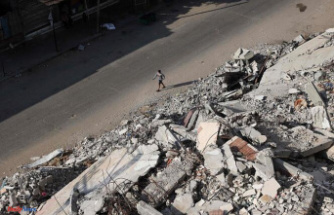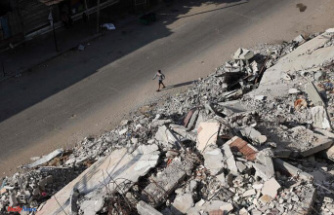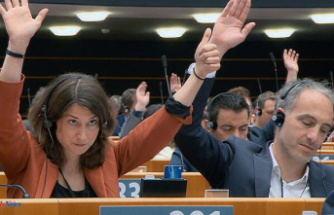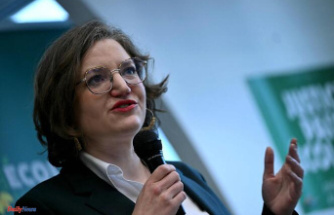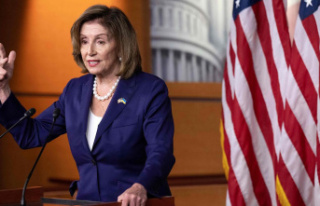In Bavaria, the cow is often a controversial creature. Sometimes it's about the noise their cowbells make - and sometimes about what the cows leave behind on the way to the pasture. The cause of cow pats now also occupied the deputy Bavarian prime minister.
Pähl (dpa / lby) - Peacefully grazing cows under a white and blue sky: Economics Minister Hubert Aiwanger could not have chosen a better backdrop for the summer theater: the minister invited cow pats to the local appointment in the Causa. In front of the cameras, the Free Voters boss handed a farmer 130 euros on Monday in Pähl in Upper Bavaria - the amount of a fine with fees that the farmer should pay because his cows had left too many flatbreads on the street. A local resident complained.
Aiwanger had packed the money for the handover in a clearly visible transparent envelope - from his own pocket, as he emphasizes. "Let's see if the cows are still allowed to shit," said the minister. It would go "clearly too far" if farmers were asked to pay because their cows produced residues on the way to the pasture, Aiwanger exclaimed to the applause of farmers and residents who had come in their dozens to the appointment and afterwards at Aiwanger's expense Rolls, cakes and drinks grabbed.
Cows were part of rural life, says Aiwanger. "That's just part of it here" - just like the ringing of the church tower, the crowing of the rooster or cow bells, the volume of which had been bitterly disputed by the authorities years ago.
Aiwanger has an answer here: "In case of doubt, for the cow." He is making a "clear commitment to grazing animals," it is a "symbolic surcharge," says Aiwanger, who immediately launches a sweeping attack: A different agricultural policy must be steered, one that is about farmers' livelihoods. He points to the farmers' contribution to the energy transition - and demands that the interests of local animal keepers should be taken seriously when it comes to wolves.
He did not speak to his colleague in the cabinet, Michaela Kaniber (CSU), who is responsible for agriculture. He comes from agriculture. "Of course I can do things," says Aiwanger. "It's a topic that I'm quite entitled to on my own."
Aiwanger is a trained farmer and used to breed piglets in his native Rottenburg an der Laaber. The deputy prime minister's frequent comments on agriculture repeatedly cause anger in the CSU, because he likes to undermine the line of agriculture minister Kaniber.
The pattern is known from the high phase of the corona pandemic: Prime Minister Markus Söder (CSU) and most of the state government appealed to the citizenry to be vaccinated, Aiwanger profiled himself as a vaccine skeptic.
In agricultural policy, the Free Voters boss is taking advantage of the anger of many farmers about the constant stream of new regulations and a certain alienation from the CSU. "In the social debate, those who have never seen a cow up close are suddenly in the majority - and they tell you how to treat a cow," he said a year ago in Kaniber's presence in front of more than 100 alpine farmers.
In this respect, the agricultural house blessing in the coalition was crooked even before the cow patty date. In CSU circles, he was commented on with the mocking question of whether the Economics Minister didn't have any more important appointments in view of the current crises. He should take better care of the energy supply.
But Aiwanger makes the connection without any problems: Cow dung can also be used for biogas plants. The potential is far from exhausted. "We could produce significantly more biogas here than farmers, if Berlin would let us." It is "completely unacceptable" that set-aside areas are not released for biogas production. Some of the firewood also comes from farmers; the farmers' land is needed for photovoltaic systems and wind turbines.
But back to the cowpat dispute: if the community takes back the fine notice, "my donation" goes to the local kindergarten, said Aiwanger. And to the address of the neighbor who, according to reports, couldn't get through the flatbread with the pram: he should "take a shovel" and get the manure as fertilizer for his garden. "He can use it to fertilize the strawberries, fertilize the tomatoes." Then the world is fine for both sides.
The resident in question, as well as Pähl's mayor Werner Grünbauer, were not invited to the appointment. Grünbauer, himself a farmer, had previously explained that by no means every dirt on the road would lead to a decision. Here, however, the resident "wouldn't have gotten out of the street without stepping in the shit." The measure had clearly been exceeded. The district office, to which the citizen had complained, called for action.
The farmer concerned, Georg Schweiger, insists that it was just a piece of cow dung, or at least the legacy of a single cow. And in times of drought, it is not advisable to waste water cleaning the streets.
According to Schweiger, the cause of the dispute no longer exists. He built a playpen. Since last Wednesday he no longer drives his 25 cows across the street to the pasture.


